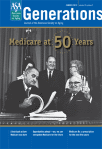
Generations
Scope & Guideline
Empowering Generations Through Scholarly Exchange
Introduction
Aims and Scopes
- Research on Aging Policy and Practice:
The journal emphasizes research that informs policies and practices affecting older adults, particularly in areas like caregiving, dementia care, and health equity. - Interdisciplinary Collaboration:
It promotes collaborative research efforts that combine perspectives from various fields, such as healthcare, sociology, psychology, and public policy, to tackle complex aging issues. - Health Equity and Social Justice:
A core focus is on addressing disparities in health and social services for older adults, particularly among marginalized communities, ensuring equitable access to resources and support. - Innovative Care Models:
The journal discusses and evaluates innovative care models and interventions aimed at improving the quality of life for older adults, including community-based approaches and technology integration. - Mental Health and Aging:
It highlights the importance of mental health in aging, exploring topics such as ageism, loneliness, and the psychological well-being of older adults. - Narratives and Storytelling in Aging:
The journal values personal narratives and storytelling as vital tools for understanding the aging experience, promoting a more nuanced view of aging beyond stereotypes.
Trending and Emerging
- Data-Driven Policy Making:
Recent publications highlight the increasing use of data to inform policy decisions related to family caregiving and elder care, reflecting a trend towards evidence-based policymaking. - Mental Health Awareness:
There is a growing emphasis on mental health issues among older adults, focusing on topics like ageism, loneliness, and the need for accessible mental health services, which is crucial for improving overall well-being. - Community and Peer Support Models:
Emerging themes include the exploration of community-based models and peer support systems for older adults, showcasing innovative approaches to combat isolation and enhance social connections. - Technology Integration in Aging:
The role of technology in improving the lives of older adults, including digital health interventions and telehealth services, is increasingly prominent, particularly in the context of the COVID-19 pandemic. - Solo Aging and Its Challenges:
Research on solo aging, particularly the unique challenges faced by older adults living independently, is gaining traction, reflecting societal shifts and the need for tailored support systems. - Intersectionality in Aging Research:
There is a notable trend towards incorporating intersectional frameworks in aging research, addressing how various identities and experiences intersect to affect older adults' lives.
Declining or Waning
- Traditional Views on Aging:
There has been a noticeable decline in papers adhering to traditional views of aging as solely a deficit model, as the journal increasingly embraces narratives that highlight aging as a positive and valuable experience. - Institutional Care Models:
Research focusing exclusively on institutional care models for older adults has waned, reflecting a broader shift towards community-based and person-centered care approaches. - Generalized Discussions on Aging:
Papers that offer generic discussions on aging without specific interventions or policies have become less frequent, as the journal seeks more targeted, evidence-based contributions. - Neglect of Intersectional Issues:
There is a decline in papers that do not adequately address intersectional issues, such as race, gender, and socioeconomic status, as the journal increasingly prioritizes these critical factors in aging research.
Similar Journals
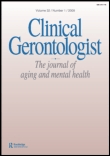
Clinical Gerontologist
Exploring the intersection of psychology and gerontology.The Clinical Gerontologist is a premier journal published by Routledge Journals, Taylor & Francis Ltd, that focuses on the interdisciplinary field of gerontology and clinical psychology. With its rich history dating back to 1982 and extending until 2024, this journal serves as a vital resource for researchers, practitioners, and students interested in the complex dynamics of aging and the psychological aspects of care for older adults. Boasting a commendable impact factor and ranking in the top quartiles across multiple categories—including Social Sciences, Geriatrics, and Clinical Psychology—the Clinical Gerontologist demonstrates its commitment to advancing knowledge and best practices within this critical area. Its rigorous peer-reviewed articles address emerging trends, evidence-based practices, and policy implications, making it essential reading for anyone involved in geriatric care and research. While not an open-access journal, it provides access to its diverse range of scholarly articles and research findings, ensuring that critical information reaches those dedicated to enhancing the well-being of the older population.
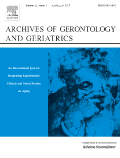
ARCHIVES OF GERONTOLOGY AND GERIATRICS
Connecting research and practice in the field of gerontology.The Archives of Gerontology and Geriatrics, published by Elsevier Ireland Ltd, is a leading journal in the fields of Aging and Geriatrics and Gerontology. With an ISSN of 0167-4943 and an E-ISSN of 1872-6976, it has established itself as a crucial platform for disseminating high-quality research focused on the biological and psychosocial aspects of aging. The journal holds an impressive Q2 ranking in both Aging and Geriatrics and Gerontology, and a Q1 ranking in Gerontology and Health (Social Science) as of 2023, reflecting its significant impact in these disciplines. Additionally, the journal is ranked #33/371 in Social Sciences (Health) and #5/39 in Nursing (Gerontology) according to Scopus, showcasing its esteemed position in the academic community. Although currently not open access, the journal offers a wealth of research articles from 1982 to the upcoming 2025 that are vital for stakeholders including researchers, healthcare professionals, and students aiming to advance their understanding of aging processes and policies. Titles published within its pages contribute to shaping agendas in public health and gerontological practice, making it an essential resource for those involved in the study of the elderly population.

Gerontology and Geriatric Medicine
Transforming elder care through high-quality research.Gerontology and Geriatric Medicine is a distinguished journal published by SAGE Publications Inc, focusing on the vital field of gerontology and geriatrics. With an impressive Q2 ranking in Geriatrics and Gerontology as of 2023, this journal serves as a crucial platform for disseminating high-quality research and innovation related to aging and elderly care. Since embracing an Open Access model in 2015, it has broadened its reach, enabling scholars, researchers, and practitioners worldwide to access valuable insights without barriers. The journal’s scope encompasses a variety of interdisciplinary studies that address the multifaceted aspects of geriatric medicine, making it an essential resource for anyone dedicated to advancing knowledge and practices in this critical domain. With its commitment to enhancing the understanding of aging populations, Gerontology and Geriatric Medicine is poised to contribute significantly to the ongoing discourse and research developments in the care for older adults.
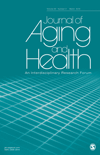
JOURNAL OF AGING AND HEALTH
Advancing understanding of aging and health.The JOURNAL OF AGING AND HEALTH, published by SAGE PUBLICATIONS INC, is a preeminent peer-reviewed journal dedicated to advancing research in the field of gerontology and related disciplines. With an impressive impact factor and ranked Q1 across multiple categories including Community and Home Care, Geriatrics and Gerontology, and Health (Social Science), this journal has established itself as a vital resource for academics, clinicians, and policymakers alike. Spanning over three decades of publication from 1989 to 2024, it serves as a platform for innovative research and multifaceted discussions on aging, health, and the interplay of social factors influencing the elderly population. The journal's rigorous standards for publication ensure high-quality contributions that are impactful and relevant, making it an essential read for those dedicated to improving the health and quality of life for older adults. Although it is not an open-access journal, it provides comprehensive insights that are critical to understanding the complexities of aging in today's society.

Canadian Geriatrics Journal
Transforming care through groundbreaking research in geriatrics.Canadian Geriatrics Journal, published by MULTIMED INC, is a prominent platform dedicated to advancing the field of geriatrics and gerontology. With its esteemed status as a Q2 journal in both Geriatrics and Gerontology categories for 2023, it ranks favorably within the academic community, holding a 73rd percentile in Nursing Gerontology and a 59th percentile in Medicine Geriatrics and Gerontology according to Scopus metrics. Since its inception in 2011, the journal has aimed to foster innovation and disseminate pivotal research that addresses the complexities of aging populations. Researchers, healthcare professionals, and students interested in the intricacies of geriatric care will find a wealth of open-access resources that contribute significantly to enhancing practice and care methodologies in Canada and beyond. With its address located at 66 Martin St, Toronto, ON L9T 2R2, Canada, the journal stands as a vital resource for stakeholders in the geriatric field.
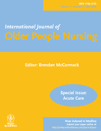
International Journal of Older People Nursing
Transforming Nursing for Older Generations.The International Journal of Older People Nursing is a pivotal publication in the field of gerontology, focusing on the unique nursing care and health challenges faced by older adults. Published by WILEY and based in the United Kingdom, this journal aims to disseminate innovative research and practice insights from 2010 to 2024, making it an essential resource for academics and practitioners alike. With an impressive 2023 Category Quartile of Q2 in Gerontology, the journal ranks in the top tier of its field, placing it at 15th among 39 journals in Nursing Gerontology according to Scopus. The journal is committed to providing a platform for rigorous scientific inquiry, facilitating improvements in nursing practices, and promoting evidence-based care for older adults. Researchers, professionals, and students can benefit from the high-impact contributions that address the complexities and richness of aging, thus enhancing the quality of care and life for older populations.

Advances in Gerontology
Connecting Scholars to the Science of AgingAdvances in Gerontology is a pivotal academic journal dedicated to the field of gerontology, published by PLEIADES PUBLISHING INC. With its ISSN 2079-0570 and E-ISSN 2079-0589, this journal serves as an essential platform for researchers, healthcare professionals, and students focused on aging and related health issues. Although currently not an open-access journal, it aspires to enrich the scholarly community by disseminating high-quality research from 2011 through 2024. The journal is recognized in the lower quartile of its category, ranking Q4 in both Geriatrics and Gerontology, reflecting its commitment to addressing emerging topics in the aging population despite its lower visibility in the competitive landscape. As it continues to explore critical areas in gerontology, Advances in Gerontology invites contributions that advance knowledge, foster understanding, and inform practices within this essential field of study.

Aging Medicine
Connecting Researchers and Practitioners in AgingAging Medicine, published by Wiley, is a pivotal open-access journal that has been at the forefront of research dedicated to the aging population since its inception in 2018. With a focus on both geriatric care and gerontology, the journal serves as a crucial resource for researchers, healthcare professionals, and students interested in understanding the complexities of aging and the related medical challenges. Although it holds a Q3 quartile ranking in the fields of Aging and Geriatrics and Gerontology according to the 2023 metrics, the journal continues to effectively disseminate valuable research and insights, helping to bridge gaps in knowledge and practice. With an E-ISSN of 2475-0360, it offers an open-access model that ensures broader accessibility to its published content, thus promoting collaboration and innovation across disciplines. As the journal converges towards 2024, it remains committed to evolving with the dynamics of aging research, making it a significant platform for the exchange of ideas and advancements in this essential field.

Turkish Journal of Geriatrics-Turk Geriatri Dergisi
Innovating care for the aging population.The Turkish Journal of Geriatrics (Türk Geriatri Dergisi), with ISSN 1304-2947 and E-ISSN 1307-9948, is a distinguished scholarly publication dedicated to the field of geriatrics and gerontology, proudly published by the Turkish Geriatrics Society. Established to foster knowledge and research in the aging population, this journal plays a crucial role in disseminating significant findings and advancements in the medical care of elderly individuals. Since its inception in 1998, the journal has committed to high-quality, peer-reviewed articles that explore diverse aspects of geriatric medicine, contributing vital insights to practitioners and researchers alike. Although it currently holds a Q4 ranking in the category of Geriatrics and Gerontology, the Turkish Journal of Geriatrics is on an upward trajectory, making it an essential resource for those specializing in the care of older adults. Researchers and professionals are encouraged to explore its rich archive and benefit from the open-access publishing model, promoting broader access to impactful research. For those invested in the well-being of the elderly, the Turkish Journal of Geriatrics serves not only as a platform for scholarly communication but also as a catalyst for innovation in geriatric care.

Research in Gerontological Nursing
Fostering Research that Transforms Gerontological CareResearch in Gerontological Nursing is a premier peer-reviewed journal dedicated to advancing the field of nursing as it intersects with gerontology. Published by SLACK INC, this influential journal provides an essential platform for researchers, clinicians, and educators focusing on the health and well-being of older adults. Since its inception in 2008, it has fostered critical discourse and innovation, bridging gaps between nursing practices and gerontological research. The journal proudly holds a Q3 ranking in both Geriatrics and Gerontology as well as Health Policy, and a Q2 ranking in miscellaneous Nursing categories as of 2023, reflecting its commitment to quality and relevance in these vital areas of study. While not open access, the journal offers a subscription-based model that guarantees readership and citation within the academic community. With its Scopus rankings highlighting its growing impact—ranked #23 in Nursing Gerontology and #59 in General Nursing—Research in Gerontological Nursing serves as an indispensable resource for those dedicated to improving care for the aging population.